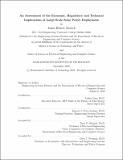| dc.contributor.author | Merrick, James Hubert | en_US |
| dc.contributor.other | Massachusetts Institute of Technology. Dept. of Electrical Engineering and Computer Science. | en_US |
| dc.date.accessioned | 2011-04-04T17:37:47Z | |
| dc.date.available | 2011-04-04T17:37:47Z | |
| dc.date.copyright | 2010 | en_US |
| dc.date.issued | 2010 | en_US |
| dc.identifier.uri | http://hdl.handle.net/1721.1/62089 | |
| dc.description | Thesis (S.M. in Technology and Policy)--Massachusetts Institute of Technology, Engineering Systems Division, Technology and Policy Program; and, (S.M.)--Massachusetts Institute of Technology, Dept. of Electrical Engineering and Computer Science, 2010. | en_US |
| dc.description | This electronic version was submitted by the student author. The certified thesis is available in the Institute Archives and Special Collections. | en_US |
| dc.description | Cataloged from student-submitted PDF version of thesis. | en_US |
| dc.description | Includes bibliographical references (p. 185-191). | en_US |
| dc.description.abstract | Electricity from solar energy has many favorable attributes. Despite its current high cost relative to other technology options, a combination of cost reductions and policy support measures could lead to increasing deployment of solar power technologies. Should this pathway occur, the unique technical and economic characteristics of photovoltaics (PV) and concentrating solar power (CSP) technology will have implications for the wider electric power system. Similarly, the characteristics of the many elements that constitute electric power systems will have implications for the efficient deployment of these technologies. This thesis attempts to assess these technical and economic implications, and derive regulatory implications that result. A static cost-minimization expansion model with an 8760 hour temporal resolution, adapted from the literature, was developed in order to undertake this investigation. Following analytical development of the model formulation, the model was numerically applied to a simplified representation of the ERCOT power system. This application involved assessing changes in investment, dispatch, prices and emissions across various solar power deployment scenarios. The final portion of the thesis then addressed the complexities associated with developing the necessary transmission that may accompany large-scale solar power deployment. Findings from this work include: a) an explicit representation of the components that constitute the marginal system value of PV capacity under transmission constraints b) reasoning for why the optimal system with large scale solar power capacity includes less baseload capacity in the long term - and insights into how this may not be feasible in real systems, and c) a presentation of how solar power deployment paths diverge across capacity and energy support schemes, and across type of solar technology. In addition, it is found that: d) under perfect conditions, locational market prices will provide the adequate locational signals for `system-ecient' deployment, provided that the solar generators 'see' the signals in their objective functions, and e) the appropriateness of transmission charges for solar generators will vary by circumstance - any charge warranted should be considered in tandem with the system pricing mechanism and any renewable support scheme in place. | en_US |
| dc.description.statementofresponsibility | by James Hubert Merrick. | en_US |
| dc.format.extent | 211 p. | en_US |
| dc.language.iso | eng | en_US |
| dc.publisher | Massachusetts Institute of Technology | en_US |
| dc.rights | M.I.T. theses are protected by
copyright. They may be viewed from this source for any purpose, but
reproduction or distribution in any format is prohibited without written
permission. See provided URL for inquiries about permission. | en_US |
| dc.rights.uri | http://dspace.mit.edu/handle/1721.1/7582 | en_US |
| dc.subject | Engineering Systems Division. | en_US |
| dc.subject | Technology and Policy Program. | en_US |
| dc.subject | Electrical Engineering and Computer Science. | en_US |
| dc.title | An assessment of the economic, regulatory and technical implications of large-scale solar power deployment | en_US |
| dc.type | Thesis | en_US |
| dc.description.degree | S.M. | en_US |
| dc.description.degree | S.M.in Technology and Policy | en_US |
| dc.contributor.department | Massachusetts Institute of Technology. Department of Electrical Engineering and Computer Science | |
| dc.contributor.department | Massachusetts Institute of Technology. Engineering Systems Division | |
| dc.contributor.department | Technology and Policy Program | |
| dc.identifier.oclc | 708361537 | en_US |
